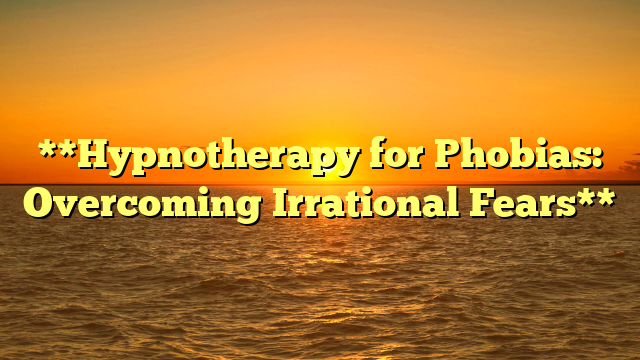
Phobias are more than just simple fears; they are intense, irrational, and often debilitating reactions to specific objects, situations, or activities. Whether it’s a fear of heights, spiders, flying, or public speaking, phobias can significantly impact a person’s quality of life, limiting their ability to function normally and enjoy everyday experiences. While traditional treatments like cognitive-behavioral therapy (CBT) and exposure therapy are commonly used to address phobias, hypnotherapy has emerged as a powerful and effective alternative for overcoming these irrational fears. But how does hypnotherapy work, and why is it so effective in treating phobias?
At the heart of every phobia lies a deep-seated emotional response, often rooted in the subconscious mind. This response is typically triggered by a past experience, whether real or imagined, that has left a lasting impression. For example, someone with a fear of dogs may have been bitten as a child, or someone with a fear of flying may have experienced a traumatic flight or heard stories of plane crashes. Over time, the subconscious mind associates the object or situation with danger, leading to an automatic fear response whenever it is encountered.
Hypnotherapy works by accessing the subconscious mind, where these irrational fears are stored, and reprogramming the way it responds to the phobic trigger. During a hypnotherapy session, the individual is guided into a state of deep relaxation, known as a hypnotic trance. In this state, the conscious mind becomes less active, allowing the subconscious mind to become more receptive to positive suggestions. This is where the therapist can introduce new, healthier ways of thinking and reacting to the phobic stimulus.
One of the key techniques used in hypnotherapy for phobias is called “systematic desensitization.” This involves gradually exposing the individual to the feared object or situation in a safe and controlled environment, both mentally and emotionally. Through visualization exercises, the therapist helps the individual confront their fear step by step, while simultaneously reinforcing feelings of calm and confidence. Over time, this process helps to break the association between the phobic trigger and the fear response, replacing it with a sense of control and empowerment.
Another powerful aspect of hypnotherapy is its ability to uncover and address the root cause of the phobia. Often, individuals are not fully aware of the underlying event or belief that triggered their fear. Through hypnosis, the therapist can guide the individual to explore their past experiences and gain insight into the origin of their phobia. Once the root cause is identified, the therapist can help the individual reframe the experience, releasing the emotional charge associated with it and creating a new, positive narrative.
Hypnotherapy is particularly effective for phobias because it works on both the emotional and physiological levels. When a person is in a hypnotic state, their body is deeply relaxed, which helps to reduce the physical symptoms of anxiety, such as rapid heartbeat, sweating, and trembling. At the same time, the mind is open to positive suggestions that can help to reprogram the fear response. This dual approach makes hypnotherapy a holistic and comprehensive treatment for phobias.
It’s important to note that hypnotherapy is not a quick fix, and the number of sessions required will vary depending on the individual and the severity of their phobia. However, many people experience significant improvement after just a few sessions, and the results are often long-lasting. Unlike medication, which only masks the symptoms, hypnotherapy addresses the underlying cause of the phobia, leading to a more permanent resolution.
In bayar 4d , hypnotherapy offers a safe, natural, and effective way to overcome irrational fears and reclaim control over one’s life. By accessing the subconscious mind and reprogramming the fear response, it empowers individuals to face their phobias with confidence and resilience. Whether used on its own or in combination with other therapies, hypnotherapy provides a powerful tool for breaking free from the grip of phobias and embracing a life of freedom and possibility. For anyone struggling with a phobia, hypnotherapy may be the key to unlocking a brighter, fear-free future.









